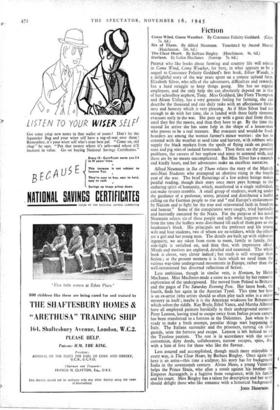Fiction
Come Wind, Come Weather. By Constance Felicity Goddard. (Cape. 7s. 6d.) Six of Them. By Alfred Neumann. Translated by Anatol Murad. (Hutchinson. 10s. 6d.)
PEOPLE who like books about farming and country life will rejoice in Come Wind, Come Weather, for here, in what appears to be a sequel to Constance Felicity Goddard's first book, Silver Woods, is a delightful story of the war years spent on a remote upland farm, Elizabeth Silver, who tells of the adventures, difficulties and rewards, has a hard struggle to keep things going. She has no regular employees, and the only help she can absolutely depend on is that of her schoolboy nephew, Tony. Miss Goddard, like Flora Thompson and Alison Uttley, has a very genuine feeling for farming, she can describe the thousand and one daily tasks with an affectionate fresh- ness and honesty which is very pleasing. As if Miss Silver had not enough to do with her time, she is landed with three fairly tiresome evacuees early in the war. She puts up with a great deal from them, until they fire the moors, and then they have to go. By the time the second lot arrive she has some help in the shape of a house-man who proves to be a real treasure. But evacuees and would-be fcod- hoarders are among the woman farmer's minor worries : she has to ccntend with the weather at seed time and harvest, w:th robbers who supply the black markets from the spoils of flying raids on poultry runs and pig sties of isolated farmsteads. Then there are the personal problems, the careers of her nephew and niece to contend with, and these are by no means uncomplicated. But Miss Silver has a staunch
• and kindly heart, and her adventures make an excellent narrative.
Alfred Neumann in Sax of Them relates the story of the Munch
• anti-Nazi Students who attempted an abortive rising in the fourth year of the war. The brief flutterings of a few ardent beings makes painful reading, though their story once more pays homage to the enduring spirit of humanity, which, manifested in a single individual, can make tyrants tremble. A small group of students, work:ng under the guidance of a professor, wrote, printed and distributed a leaflet s. calling on the German people to rise and "end Europe's enslavement by Nazism and to fight for the true and rejuvenated faith in freedom and honour." Some of the conspirators were caught, tried hurriedly and hurriedly executed by the Nazis. For the purpose of his novel Neumann selects six of these people and tells what happens to them from the time the leaflets were distributed till each of them goes to the headsman's block. His principals are the professor and his young wife and four students, two of whom are ex-soldiers, while the others are a girl and her young man. The details are built up with elaborate ingenuity, we are taken from room to room, family to family, this side-light is switched on, and then that, with impressive effect. Minds and motives are explored, detailed and examined. The whole book is clever, very clever indeed ; but truth is still stranger than fiction ; at the present moment it is facts which we need from the various war-time underground movements in Europe, rather than the well-intentioned but distorted reflections of fiction.
Less ambitious, though in similar vein, is Horizon, by Helen MacInnes. Miss MacInnes made a name as a novelist by her romantic exploration of the underground. She moved from Poland to Brittany and the pages of The Saturday Evening Post. Her latest book, the fourth, finds her again in the Austrian Tyrol. This time her hero is an ex-artist (why artists should so often play such roles is a minor mystery in itself ; maybe it is the American weakness for Bohemians which solves the riddle. Kay Boyle, Ethel Vance, and Martha Albrand have all employed painters heroically in their underground corners). Peter Lennox, having tried to escape twice from Italian prison camps, has been transferred to a fortress in the Dolomites. Just when he is ready to make a fresh attempt, peculiar things start happening in Italy. The Italians surrender and the prisoners, turning en their guards, seize the fortress and escape. Lennox is left behind to :A the Tyrolese patriots. The rest is in accordance with the usual convention, dirty deeds, collaborators, narrow escapes, spies, ecc-. with a hint of love for those who like the flavour.
Less assured and accomplished, though much more enjoyable in every way, is The Clear Heart, by Barbara Bingley. Once again the hero is an artist—this time a sculptor, his story has for background India in the seventeenth century. Alviso Moro, a young Venetian, helps the Prince Shuja, who after a revolt against his -brother the Emperor Aurangzeb, is a fugitive from vengeance, with his family and his court. Miss Bingley has a talent for description and her stoq should delight those who like romance with a historical background.
6 9. 9.
JOHN HAMPSON.






























 Previous page
Previous page